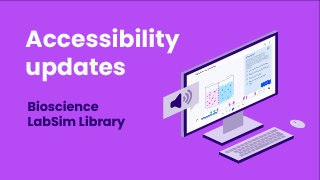In my role as a lecturer at Warwick University and Academic Lead at LearnSci, I am critically aware of the current pressures faced by teaching academics in the HE sector. Keeping one eye on your mounting workload and the other on exploring best practice and innovation is not easy- it requires time and energy, both a precious resource. We also know that student engagement with our teaching strategies is changing, giving us limited time to adapt and facilitate effective learning capital gain. Studies also indicate that a significant portion of students require an asynchronous online learning pedagogical paradigm for improved flexibility, accessibility and achievement (Natan et al 2022). And that the illusion of attendance in lectures is possibly inhibiting our desire to make meaningful change (Loughlin 2024).
I was lucky enough to attend the Minoritised Life Scientists Future Forum conference, where I discussed barriers to engagement with talented undergraduates showcasing their posters and entrepreneurial business ideas. The common sentiment was ‘Why would I spend money to travel to an hour lecture to read and listen to information I may not understand, when I can use a 20 minute Youtube video and actually see how ‘things’ work?’. The way students are choosing to construct their own knowledge is shifting away from what educators currently offer. We need to use this to our advantage; leverage the value students hold for flexible and focussed learning opportunities, and lean into the potential of technology and digital provision. Not just for students, but for practitioners too. The right combination of technology and traditional methods can improve engagement and learning efficiency (Shallcross D et al 2024; Coyte E and Lowry R 2024), and when used strategically can also reduce workload and enhance staff teaching experiences.
Over the last few years I have been working on a framework named ‘Technology-enabled Equity for Teaching and Learning’ (TeETL), which stands upon three key principles. ‘Equity of opportunity’ means ensuring all students, regardless of background or access to resources, have equal chances to succeed. ‘Responsive pedagogy’ acknowledges that learners have diverse needs and learning requirements, often amplified by inequality requiring adaptive teaching strategies. Thirdly, ‘sustainability’ means managing workloads for a sustainable worklife balance.
So, how can LearnSci help us work toward this? We know that the automated grading and feedback features of Smart Worksheets benefit students and significantly reduce the time spent on marking, allowing educators to focus on personalised student support and curriculum development. Having access to a suite of resources enables you to increase your provision without impacting your workload.
At the end of 2024, LearnSci launched the Smart Worksheet Library. Drawing on high quality content from a significant back catalogue, it offers a comprehensive repository of bioscience and chemistry resources. Over the last three months, we have teamed up with highly skilled and experienced practitioners to design and develop exciting new content, to more than double the provision for the next iteration of the Library. The new content for both chemistry and bioscience will provide valuable resources to support any programme.
To give you a peek at what is to come, our Chemistry Designer, Dr Josie Harcourt, identifies her favourite addition. ‘I’m really happy with the ideal gas law Smart Worksheet - it includes lots of practice for unit conversions, which is a common area that students find challenging. We also designed some fun animations and scenarios which aid understanding and make for a really engaging sheet’. Biology Designer Dr Matt Harwood, says: ‘The microbial cell counting Smart Worksheet is great, because it mimics real life data collection! Students use a free-hand marker interactive linked to a cell counter, exactly like using a marker to count on the back of an agar plate. They do that three times, calculate an average, and do their CFU/mL calculations - just like in the lab’. The team also made a right bloody mess whilst learning about trigonometry and blood pattern analysis at the University of Central Lancashire with Paul Langton.
Personally, I am incredibly excited about the content that we have developed in collaboration with the Institute of Biomedical Science (IBMS). Working with subject matter experts, including clinical practitioners, we have created a collection of Smart Worksheets that cover content relevant to the clinical specialisms of clinical genetics, clinical biochemistry, haematology and transfusion science, cellular pathology, medical microbiology and clinical immunology. Not only are these subjects close to my heart, but the way in which the learning is scaffolded is very exciting from a TeETL perspective. The extent of correct and incorrect answer feedback enables students to engage in self-directed explorative learning, and getting it wrong to get it right! I see these sheets as incredibly powerful low stakes formative activities.
In today's dynamic educational landscape, the challenges of workload management and ensuring equitable learning opportunities are more pressing than ever. The insights shared by students and the data that supports the use of digital learning reveal a clear need for more rapid, adaptive and responsive teaching strategies. The Smart Worksheet Library, with its significantly improved scope and focus on interactive, engaging, and accessible content, directly addresses these needs. By leveraging technology to streamline learning and assessment, provide personalised feedback and deliver high-quality learning resources, we can empower both students and educators. This library is not just a collection of digital tools; it's a step toward realising the principles of Technology-enabled Equity for Teaching and Learning. It allows us to create a sustainable and equitable learning environment where every student has the opportunity to thrive, and every educator has the resources to excel. We invite you to explore the Smart Worksheet Library and join us in shaping the future of bioscience and chemistry education.
Are you interested in how the Smart Worksheet Library could impact your department and create a more equitable learning environment? Get in touch by requesting a demo and our team will be happy to help.




.jpg)
.jpg)